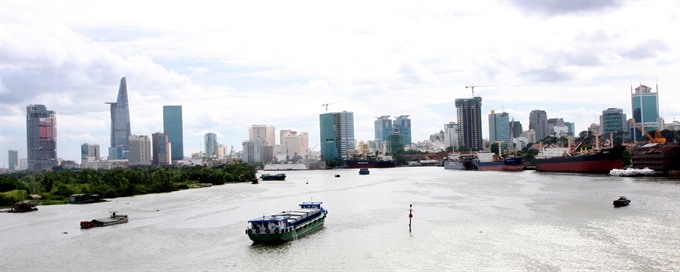 Society
Society

The HCM City People's Council closed its ninth session on Thursday, approving 21 resolutions after three days of work.
 |
| A view of the Sài Gòn Port in HCM City. Experts discuss solutions for the city’s socio-economic development at a meeting on Thursday.—VNA/VNS Photo Đình Huệ |
HCM CITY — The HCM City People’s Council closed its ninth session on Thursday, approving 21 resolutions after three days of work.
The resolutions focused on socio-economic development for the second half of the year; the city’s housing development programme from 2016 to 2025; lists of land projects; and the new task force for flood-prevention projects.
In her closing speech, Nguyễn Thị Quyết Tâm, chairwoman of the council, said in the first half of 2018, implementation of the council’s resolutions on socio-economic development, social order and security had achieved positive results.
She pointed out, however, that many goals will not be realised if the city does not deploy intensive solutions in the coming time.
“Management of State land is loose and ineffective; science and technology hasn’t developed to its potential or met development demand; and the seven breakthrough programmes have been carried out slowly,” she said.
“The implementation of People’s Council resolutions under the National Assembly’s resolution 54 about special governance policies for HCM City has also been very slow,” she added.
At the meeting, the Council members discussed the progress of scientific and technology development during a question and answer session.
Delegate Lê Thị Ngọc Thanh pointed out that scientific research of students helps develop their creativity, but she noted that the number and quality of research projects were still limited.
“How can the city promote scientific research among students in the coming time?” she asked.
Delegate Lê Thị Hồng Xuân said that many institutes and universities have sent their best scientitsts to conduct research about problems of other provinces.
“Should we worry when scientists co-operate with other localities rather than HCM City? Do neighbouring provinces have better co-operation with scientists?” she said.
The delegates said the number of enterprises receiving funds under an incentive policy for applied research was still low.
State managers shoul identify the barriers and help enterprises promote science and technology development for commercial purposes, they said.
“Every year, the Science and Technology Department spends 20 per cent of budget for scientific research and closely links with universities and institutes on current key issues, such as traffic congestion, anti-flooding, building a smart city,” Nguyễn Việt Dũng, director of the department, said.
According to him, the department has supported students’scientific research, but due to a limited budget, the activity has not had positive results.
In response to a question about the proportion of startup businesses having failed soon after setting up, Dũng said it was normal because such breakthrough ideas will either survive or die in a market economy.
“The department has organised many training courses for startup businesses to help them prepare well before starting their business,” he added.
Waste treatment also remains a major concern, with local residents at the meeting voicing their complaints about pollution caused by garbage.
The city government annually spends up to VNĐ4 trillion (US$173.6 million) collecting, transporting, classifying and treating garbage, and dredging wastewater drainage systems.
“The city discharges some 9,000 tonnes of garbage daily,” Nguyễn Toàn Thắng, director of the city’s Department of Natural Resources and Environment, said.
“The city cannot collect all the waste thrown into the environment, which obstructs sewers and causes odors,” he added.
Thắng proposed asking investors of waste treatment complexes to apply waste-to-energy technology instead of burying garbage.
In the next five to 10 years, HCM City will have 10 waste treatment plants which will convert waste into electricity. The city government has called for investments in waste treatment projects that use modern technologies.
During the meeting, the effects of the trade war between the US and China on the Vietnamese economy was also discussed.
Delegate Vương Đức Hoàng Quân urged local enterprises and agencies to assess both the positive and negative effects of the trade war to make good use of opportunities and minimise negative effects on domestic production and trade with the world’s two largest economies.
He said that the city should respond to the trade war by preparing appropriate solutions to develop the economy in the second half of the year. — VNS




